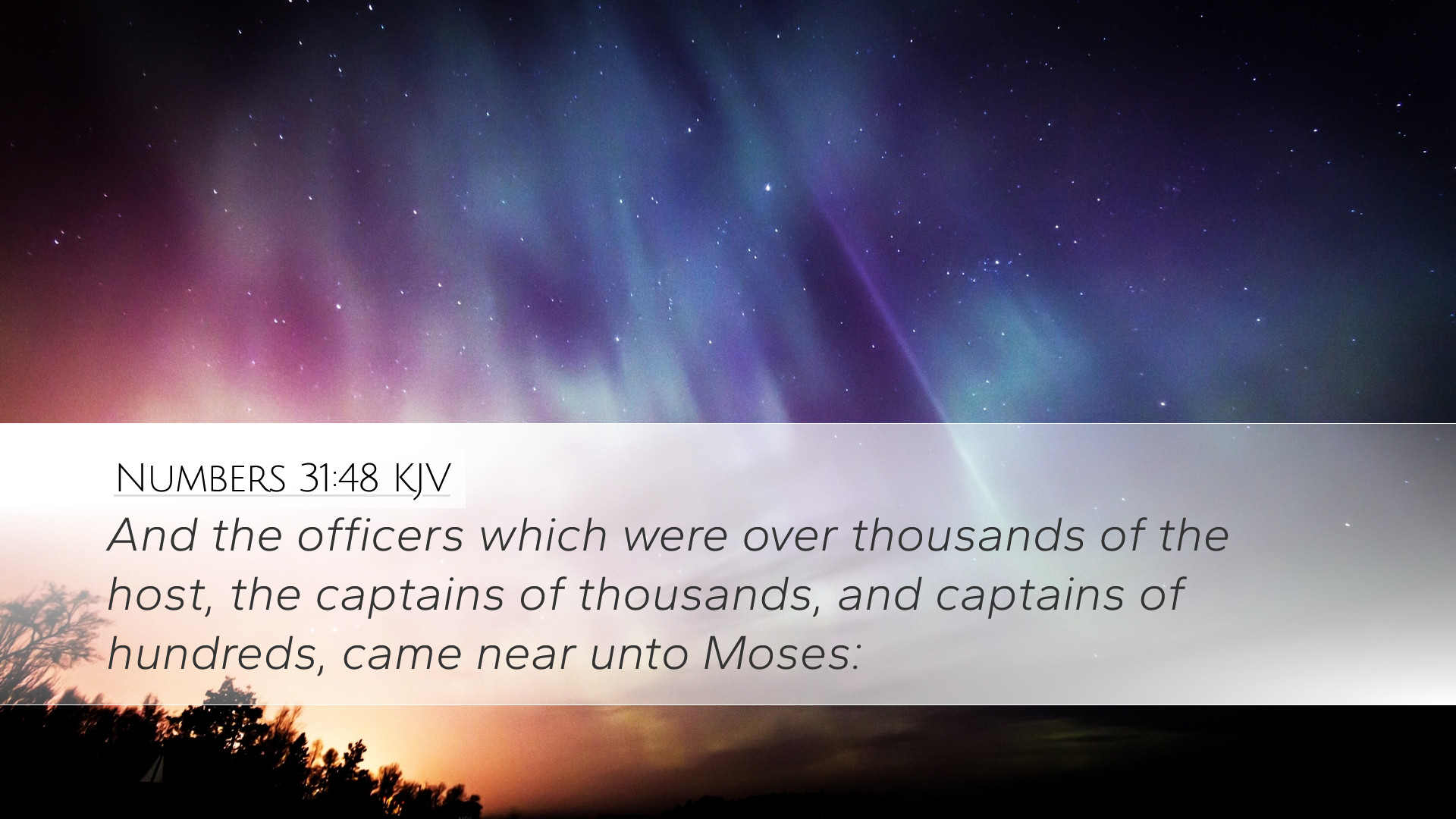Commentary on Numbers 31:48
Verse: "And the officers who were over thousands of the army, the captains of thousands and the captains of hundreds, came near to Moses."
Introduction
This passage from Numbers 31:48 comes at a pivotal moment for the Israelites. After the conquest of the Midianites, the military leaders report back to Moses, reflecting both their success and the responsibilities that lay ahead. The transformation from military action to spiritual accountability is a theme woven throughout God's dealings with His people, particularly seen in the leadership roles present in this verse. The insights from public domain commentaries will guide us in understanding the significance of this moment in Israel's history.
Contextual Background
The 31st chapter of Numbers describes God's command to take vengeance on the Midianites, who had led Israel into sin (Numbers 25:1-3). Following the victorious campaign, the officers return not only to report the outcome but to engage in a dialogue concerning the spoils of battle and the purification rituals to be observed. This moment in the text emphasizes accountability and the importance of divine orders, showcasing the holistic interaction between military goals and spiritual mandates.
Key Themes and Insights
-
Leadership Accountability:
According to Matthew Henry, the returning officers signify a key aspect of leadership—accountability. The leaders over thousands and hundreds come to Moses to present their actions and seek guidance. This highlights the necessity for every leader to report their stewardship to God and fellow believers, emphasizing transparency and responsibility in leadership roles.
-
Divine Command and Human Action:
Adam Clarke points out that the military actions taken against Midian were initiated by God as a response to their transgressions against Israel. The verse underscores that even in human conflict, the ultimate authority lies with God, who directs and designs outcomes for His purposes. Each military success is showcased as a result of divine favor rather than mere human strategy.
-
Commemoration of Victory:
Building on the commentary by Albert Barnes, this return of the officers also serves a dual purpose—both reverence for the military success against Midian and gratitude towards God. This moment indicates a communal acknowledgment of God's providential hand in the defeat of the enemy. It models for readers and leaders today the importance of giving glory to God for victories both big and small.
Application for Contemporary Readers
Reflecting upon Numbers 31:48 has profound implications for pastors, students, theologians, and Bible scholars in assessing leadership within contemporary ministry contexts. Key takeaways include:
-
Integrity in Leadership:
Just as Moses required accountability from his leaders, modern pastors must encourage environments of transparency where leaders are held accountable to their congregations and to God.
-
Submission to Divine Authority:
In all endeavors, leaders must remember that they serve under God's authority. The outcomes of ministry should always bring glory to God, reflecting the understanding that He is the source of all success.
-
Community and Collaboration:
The gathering of the army's leaders represents the need for collaborative efforts among church leaders, believers, and ministries. Joint reporting and shared victories foster a spirit of unity and joint purpose.
Conclusion
Numbers 31:48 encapsulates a moment of reflection, accountability, and divine recognition following military action. Through the insights provided by public domain commentaries, we gain a more profound understanding of the implications of leadership among the Israelites and the expectations of those who are entrusted with guiding God's people. The rich tapestry of this event in biblical history serves as an essential lesson for all who seek to lead within the context of Christian ministry today.


